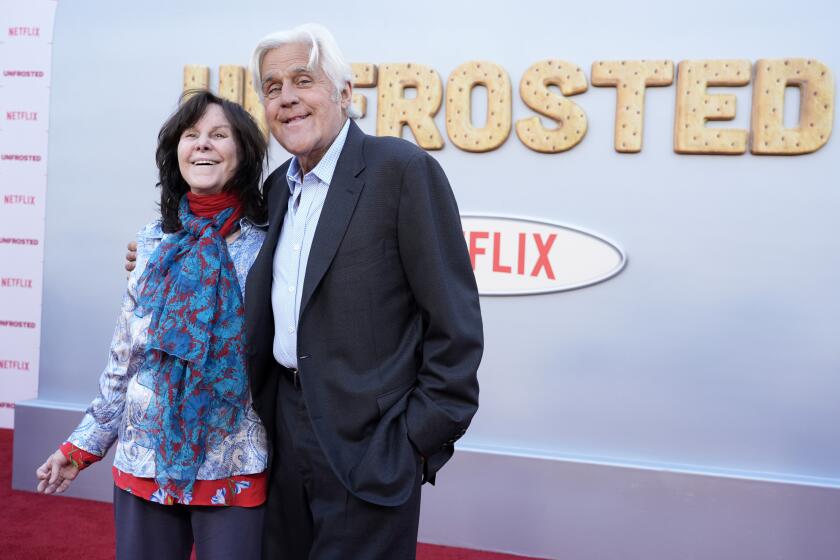For so-and-so, with love
- Share via
“For Sherrell, Who’s helped show me the way from my earliest recollections, and whose love and spirit -- abundant in every way -- are a large part of the life behind this book and the life in this book. My Love Always, Roy. Old Chatham, NY, 12/25/82.”
On the flyleaf of the book, black ink swirls, loopy letters leaning right, taking me back to the wintry evening I presented it -- a copy of my brand new first novel -- to my big sister. I was 29 and she was 44, the eldest of us, and when she read the inscription she got teary, hugged the book and me. It would occupy forever, I believed, a hallowed spot on her shelf.
I was reminded of this not long ago when I slipped this same volume out of an envelope mailed to me in Alabama by another sister who was going through Sherrell’s effects in New York. Cancer had taken Sherrell from us, and as she was widowed, her books, like all else, were parentless.
I presumed I had given her the book forever, but, in fact, it was merely on long-term loan. I set it on a special place on my bookshelf, next to copies of my works with inscriptions beginning, “To Mom and Dad.” I could not bear to think of these copies either, their beloved recipients gone, tossed into the twilight of book barns and estate sales.
An inscribed book -- whether one is the author or not -- occupies a special place in the pantheon of personal belongings.
The kind words on my copy of “The Life of Poetry,” by the late Muriel Rukeyser, recall the workshop I took with her at Manhattan’s 92nd Street YMHA in 1975, the day she signed the book, and the intensity of the aspiring poets around the table.
The simple note, “To the Hoffmans, Dec. 4, 1991,” in the crabbed script of Eudora Welty on her “Collected Stories,” is a locket in which I carry the brief exchange I had with Welty about her rollicking “Why I Live at the P.O.”
I think of a galley I signed for my bibliophile friend Tom who had 10,000 books in his small Manhattan apartment. When Tom died in 2004, his parents donated his library to a school in the Philippines. Somewhere, I like to think, a youngster is not only enjoying a narrative I’ve written, but also pausing to consider the friendship expressed on the galley’s title page, beginning: “To Tom.”
Some inscriptions bring back not so much old friends lost, as times lost with old friends: my buddy Karl, whose 1982 gift of Joyce Cary’s “The Horse’s Mouth” likens me, in his inscription, to a character in the novel; a college girlfriend’s tender words in a two-volume set of Thomas Wolfe’s notebooks -- a reminder both of easy-going undergraduate days as well as my ardor for the rangy North Carolina novelist I now find difficult to read.
On my own shelves are the mysteries of other long-ago relationships, suggested by lines scrawled in books I’ve picked up at sidewalk sales.
My 1961 copy of the anthology “The Romantic South” features, in dark green, blocky letters, this simple wish: “To Jennie Lee, From Uncle Joe and Aunt Hattie, Xmas 1961. I hope you like this as well as we do.”
A 1942 edition of “ Sherwood Anderson’s Memoirs,” bears, in elegant black pen, this cryptic comment: “To my lovely wife, Anne, who claims to be ‘full-grown.’ Irving, 6/4/42.”
I know nothing more about Jennie Lee and Anne, but I do know what they were reading -- or set on the shelves meaning to, until they drew their last breath, or decided it was time for housecleaning.
Not every inscription is sacred, of course. I’ve seen the most famous authors dash off, for long lines of admirers, signatures as indifferent and illegible as doctors’ prescriptions on Rx pads.
As a reporter, I had to cover a 1999 signing by Monica Lewinsky of her memoir “Monica’s Story” at a New Orleans bookstore. As buyers filed past, Lewinsky dashed off her name, gave a big smile and went on to the next with the precision of a worker in a factory line. I did however save my copy -- with co-author Andrew Morton’s signature too -- for odd political posterity.
High or low, a signed book deeply appeals to us because the handwriting is a reminder of where all written language starts -- the alphabet on the page. Even a 900-page novel typed out on a computer keyboard begins, for the author, with the fat pencil he or she clutched as a child. Against the hieroglyphs printed inside the book itself, the signature at the start is a message not so much in the bottle as on it: I was here.
Those of us who give books to babies of friends often inscribe them. Chances are that decades from now those babies, all grown up, will dig out their children’s books for the next generation and discover our salutations on “Make Way for Ducklings” or “Good Night, Moon.” We’ll be briefly remembered for the swirl of our pen.
We could do worse.
Hoffman, a staff writer for the Press-Register in Mobile, Ala., is author of the novels “Almost Family” and “Chicken Dreaming Corn.” He is completing a new novel, “Come Landfall.”
More to Read
The biggest entertainment stories
Get our big stories about Hollywood, film, television, music, arts, culture and more right in your inbox as soon as they publish.
You may occasionally receive promotional content from the Los Angeles Times.










